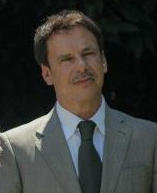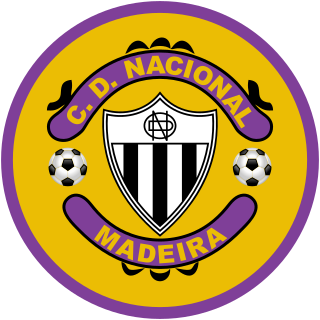Top Qs
Timeline
Chat
Perspective
C.D. Nacional
Portuguese football club From Wikipedia, the free encyclopedia
Remove ads
Clube Desportivo Nacional (Portuguese pronunciation: [nɐsjuˈnal dɐ mɐˈðɐjɾɐ]), commonly known as Nacional da Madeira and sometimes just Nacional, is a Portuguese football club based in Funchal, on the island of Madeira.[1]
Founded on 8 December 1910, it currently plays in the Liga Portugal , Portugal's top-tier division of professional football. It plays its home games at Estádio da Madeira, also known as Estádio da Choupana. Built in 1998 and named at the time Estádio Eng. Rui Alves after the current club president Rui Alves, it seats approximately 5,200 people. The stadium is located in the north of Funchal, high in the mountains of the Choupana district. The club's home colours are black and white striped shirts with black shorts and socks. Nacional is also known for being one of the clubs that formed Portuguese international Cristiano Ronaldo and to honour the club's most famous player they named their youth training facilities Cristiano Ronaldo Câmpus Futebol.
The Alvinegros played in the Primeira Liga in 1988–91, 2002–17, 2018–19 and 2020–21. Their best top-tier league finish was fourth in the 2003–04 and 2008–09 seasons, with Brazilian striker Nenê winning the Bola da Prata for top scorer with 20 goals in the latter. They have played in the UEFA Europa League on five occasions between 2004 and 2014, beating Zenit St. Petersburg in the play-off round and taking third place in the group stage in 2009–10. The team has reached the Taça de Portugal semi-finals four times between 2009 and 2023, and the Taça da Liga semi-final in 2010–11. Notable managers include Manuel Machado, who led the team in five spells from 2005 to 2021. They currently play in Primera Liga, after they got promoted from the 2023–24 Liga Portugal 2.
Like many other Portuguese clubs, Nacional operates several sports teams outside the football team. Other sports groups within the organisation include beach soccer, boxing, artistic gymnastics, rhythmic gymnastics, tennis, triathlon, muay thai, padel, rallying, swimming and veterans' soccer.
Remove ads
History
Summarize
Perspective
Nacional reached the first division for the first time ever with a three-season spell from 1988. Under manager José Peseiro, the team returned for 2002–03 after winning promotion in third place.[2] The team finished comfortably in 11th, with results including a 1–0 home win over S.L. Benfica on 28 September 2002 and a 3–2 win at C.S. Marítimo in the Madeira derby the following 2 February.[3] Peseiro's successor Casemiro Mior took the team to a joint-best 4th place in 2003–04, including another home win over Benfica, shortly after that team had knocked them out of the quarter-finals of the Taça de Portugal.[4] Stars of this team included Brazilians Paulo Assunção (defensive midfielder) and forward Adriano (16 and 19 goals in respective seasons), both of whom later played for FC Porto.[5]
Nacional's debut European season in the 2004–05 UEFA Cup ended in the first round with a 4–1 aggregate loss to Spain's Sevilla FC.[6] In January 2005, Mior left for Club Athletico Paranaense in his homeland.[7] Manuel Machado led the team to fifth in 2005–06, again reaching the UEFA Cup, but left due to his wife and children living in continental Portugal.[8] The club's second run in European competition again ended at the first hurdle, 3–1 on aggregate to CS Rapid București of Romania.[9]

Under the returning Machado in 2008–09, again edged S.C. Braga for fourth spot. Brazilian forward Nenê earned the Bola da Prata for top scorer with 20 goals, three more than Benfica's Óscar Cardozo and Sporting CP's Liédson.[10] The side also reached the last-four in the Portuguese Cup, losing on aggregate 5–4 to F.C. Paços de Ferreira, with the decider coming at the Estádio da Madeira in the 90th minute.
Nacional started the 2009–10 season without Nenê, who was sold in June to Cagliari Calcio of the Italian Serie A for a fee potentially rising to €10 million.[11] However, in August the club won a European tie for the first time, defeating 2008 champions FC Zenit Saint Petersburg 5–4 on aggregate in the playoffs of the renamed UEFA Europa League; the team were heading out on the away goals rule until a last-minute goal from youngster Rúben Micael earned a 1–1 draw in Russia.[12] Nacional were eliminated in the group stage, third behind SV Werder Bremen and Athletic Bilbao but ahead of FK Austria Wien.[13] In 2010–11, former club players Predrag Jokanović and Ivo Vieira led the team to 6th and a European return, as well as the semi-finals of the Taça da Liga for the first time (at Porto's expense), losing 4–3 to Paços de Ferreira. In the following season, following Europa League playoff elimination by Birmingham City, the team made the national cup semi-finals again, losing 5–3 on aggregate to Sporting.[14]
In his fourth of five spells as Nacional manager, Machado led the team to 5th in 2013–14, making the Europa League playoffs and falling at the first hurdle 5–2 on aggregate to FC Dinamo Minsk of Belarus.[15] In the 2014–15 Taça de Portugal they made a third semi-final in seven years, again losing to Sporting.[16] The 2016–17 season, which included Jokanović's fourth spell as manager, ended with relegation in last place, a conclusion to 15 years in the top flight.[17]
Former Portugal international Costinha was hired in 2017 and won promotion at the first attempt as champions of the 2017–18 LigaPro; Cape Verde international striker Ricardo Gomes was the league's top scorer with 22 goals in 36 games and left the club for FK Partizan in Serbia at the end of his contract.[18] Costinha left after relegation from the 2018–19 Primeira Liga, in which results included a 10–0 loss to eventual winners Benfica.[19][20]
The 2019–20 LigaPro was abandoned due to the COVID-19 pandemic in Portugal, resulting in promotion for first-placed Nacional; it was the sixth promotion in the career of 34-year-old manager Luís Freire.[21] The team were immediately relegated in last place, with Freire sacked in March 2021 and Machado seeing out the season in his fifth spell.[22] The team reached the semi-finals of the 2022–23 Taça de Portugal, losing 7–2 on aggregate to Braga,[23] while the league season went to the final day; a 3–2 home win over Académico de Viseu F.C. after losing at half time saved the team in 14th place while B-SAD took the relegation playoff position.[24]
After 13 seasons with Hummel, the team announced its new partnership with Kappa ahead of the 2025–26 season.[25][26]
Remove ads
Club presidents
- António Ascensão Figueira (1910–1926)
- Ernesto Pelágio dos Santos (1926–1932)
- António Caldeira (1932–1936)
- Dr. Consuelo Figueira (1936–1940)
- Luís Lopes Serrão (1940–1944)
- Dr. Daniel Brazão Machado (1944–1948)
- Dr. José Telentino Costa César Abreu (1954–1958)
- Dr. António Manuel Sales Caldeira (1958–1964)
- Fernando Pereira Rebelo (1964–1965)
- Luís Lopes Serrão (1966–1969)
- Antonio Manuel Sales Caldeira (1969–1973)
- Nélio Jorge Ferraz Mendonça (1973–1993)
- Dr. Fausto Pereira (1993–1994)
- Eng. Rui António Macedo Alves (1994–2014)
- João Gris Teixeira (2014–2015)
- Eng. Rui António Macedo Alves (2015–Present)[27]
Remove ads
Stadium
The Estádio da Madeira, better known as the Choupana, houses Nacional. The current stadium is located around nearby training pitches. The club also built an academy campus in name of its most famous player, Cristiano Ronaldo. The stadium was renovated in 2007 for a new stand and also increasing the capacity to 5,200 spectators.[28] The total price of the renovations was €23 million.
In these new facilities, no stands were put behind the goals, with a tall fence used in its place. In mid-2007, the stadium name was changed to Estádio da Madeira, because of the excellent sports facilities.
Rivalry

Nacional has a big rivalry with Madeira-neighbours Marítimo. Historically, Marítimo dominated Nacional in the early years, being the first to reach European competition.
Honours
National competitions
- Segunda Liga
- Winners: 2017–18
- Segunda Divisão B / South Zone
- Winners: 1999–2000
Regional competitions
- AF Madeira Championship
- Winners (8): 1934–35, 1936–37, 1938–39, 1941–42, 1942–43, 1943–44, 1968–69, 1974–75
- AF Madeira Cup
- Winners (6): 1943–44, 1944–45, 1973–74, 1974–75, 2001–02, 2007–08
Other
- Ramón de Carranza Trophy
- Winners: 2012
League and Cup history
- A. ^ Relegated to the Segunda Liga.
- B. ^ Relegated to the Segunda Divisão.
- C. ^ Promoted to the Segunda Liga.
- D. ^ Promoted to the Primeira Liga.
- E. ^ Best Primeira Liga finish.
- F. ^ First presence in european competitions.
- G. ^ Best finish in european competitions.
- H. ^ LigaPro suspended due to COVID-19 pandemic in Portugal
Last updated: 15 May 2021
Div. = Division; 1D = Primeira Liga; 2D = Segunda Liga; 2DS = Segunda Divisão – South Zone
Pos. = Position; Pl = Match played; W = Win; D = Draw; L = Lost; GS = Goal scored; GA = Goal against; Pts = Points
R = Round (Number); QF = Quarter-finals; SF = Semi-finals; PO = Play-off; GS = Group stage
Remove ads
European record
Last updated: 28 August 2014
Q = Qualifying; PO = Play-off
Remove ads
Players
Current squad
- As of 31 July 2025[29]
Note: Flags indicate national team as defined under FIFA eligibility rules; some limited exceptions apply. Players may hold more than one non-FIFA nationality.
Remove ads
Statistics
Most appearances
- As of 4 July 2025[citation needed]
Top goalscorers
- As of 27 January 2025[citation needed]
Former coaches
 Jair Picerni (1989–91)
Jair Picerni (1989–91) Eurico Gomes (1991–92)
Eurico Gomes (1991–92) José Rachão (1993–95)
José Rachão (1993–95) Rodolfo Reis (1995–96)
Rodolfo Reis (1995–96) Jair Picerni (1996–98)
Jair Picerni (1996–98) José Alberto Torres (1998–99)
José Alberto Torres (1998–99) José Peseiro (1999–03)
José Peseiro (1999–03) Casemiro Mior (2003–05)
Casemiro Mior (2003–05) João Carlos Pereira (2005)
João Carlos Pereira (2005) Manuel Machado (2005–06)
Manuel Machado (2005–06) Carlos Brito (2006–07)
Carlos Brito (2006–07) Predrag Jokanović (2007–08)
Predrag Jokanović (2007–08) Manuel Machado (2008–10)
Manuel Machado (2008–10) Predrag Jokanović (interim) (2009–10)
Predrag Jokanović (interim) (2009–10) Predrag Jokanović (2010–11)
Predrag Jokanović (2010–11) Ivo Vieira (2011)
Ivo Vieira (2011) Pedro Caixinha (2011–12)
Pedro Caixinha (2011–12) Manuel Machado (2012–2016)
Manuel Machado (2012–2016) Predrag Jokanović (2016–2017)
Predrag Jokanović (2016–2017) Costinha (2017–2019)
Costinha (2017–2019) Luís Freire (2019–2021)
Luís Freire (2019–2021) Manuel Machado (2021)
Manuel Machado (2021) Costinha (2021)
Costinha (2021) Rui Borges (2021–2022)
Rui Borges (2021–2022) Filipe Cândido (2022–2023)
Filipe Cândido (2022–2023) Tiago Margarido (2023–)
Tiago Margarido (2023–)
Remove ads
President
 António Figueira (1910–26)
António Figueira (1910–26) Ernesto dos Santos (1926–32)
Ernesto dos Santos (1926–32) António Caldeira (1932–36)
António Caldeira (1932–36) Consuelo Figueira (1936–40)
Consuelo Figueira (1936–40) Luís Serrão (1940–44)
Luís Serrão (1940–44) Daniel Machado (1944–48)
Daniel Machado (1944–48) José Abreu (1954–58)
José Abreu (1954–58) António Manuel Caldeira (1958–64)
António Manuel Caldeira (1958–64) Fernando Rebelo (1964–65)
Fernando Rebelo (1964–65) Luís Serrão (1965–69)
Luís Serrão (1965–69) António Manuel Caldeira (1969–73)
António Manuel Caldeira (1969–73) Nélio Mendonça (1973–93)
Nélio Mendonça (1973–93) Fausto Pereira (1993–94)
Fausto Pereira (1993–94) Rui Alves (1994–14)
Rui Alves (1994–14) João Teixeira (2014–15)
João Teixeira (2014–15) Rui Alves (2015–)
Rui Alves (2015–)
Remove ads
Player records
Summarize
Perspective
Most appearances
Competitive matches only, includes appearances as used substitute.
Most goals
Competitive matches only, includes goals as used substitute.
References
External links
Wikiwand - on
Seamless Wikipedia browsing. On steroids.
Remove ads

